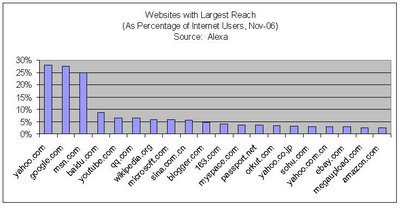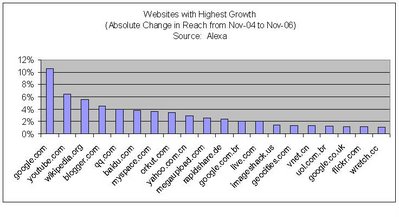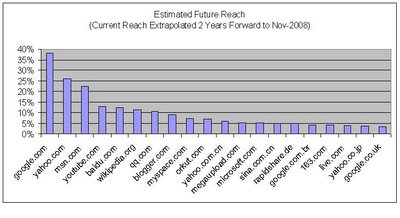Survey of Internet Growth: What's Hot and What's Not
 Gazing into the crystal ball. . . (Image credit)
Gazing into the crystal ball. . . (Image credit)Beyond the phenomenal growth in user traffic at popular websites MySpace and YouTube, where else is Internet growth the hottest?
The most widely available source of data for tracking website growth is Alexa. Compared to a listing of the world's top 15 websites almost two years ago as ranked by Alexa, today's ranking shows:
Video sharing (YouTube), social networking (MySpace and Orkut), collaborative editing (Wikipedia) and Microsoft's new Live search project are hot, but let's drill deeper down Alexa's ranking list for confirmation of trends.
Where the Internet Crowds Are Going
By categorizing each of the top 100 websites by type (e.g., Google is for search, Yahoo is a portal, Amazon and eBay are commerce-oriented, etc.) and ranking each by its growth in "reach" (defined as percentage of all Internet users who use the particular website, based on data from Alexa) over the past two years (November 2004 through November 2006), we can see what types of websites are growing in popularity and which are not. Here's the result, showing how fast various categories have extended their reach (fastest growing categories higher up on list), with representative examples of the fastest growing websites in each category:
1. Media Sharing: youtube.com, flickr.com
2. Search: google.com, baidu.com, google.com.br, live.com
3. Blog: blogger.com
4. Utility: megaupload.com, rapidshare.de
5. Social Networking: myspace.com, orkut.com
6. Informational: wikipedia.org, digg.com
7. Software: sourceforge.net
8. Portal: qq.com, yahoo.com.cn
9. Commerce: craigslist.com
Category Trends: The above list illustrates the increasing importance of Web 2.0 as a platform for user-generated content (video clips on YouTube, photos on Flickr, blogs on Blogger, re-mixing of music and other media content on MySpace, collaborative wiki-style editing on Wikipedia, user-selected news on Digg). Even the fastest growing websites in the more traditional portal and commerce categories are built on user-participation (e.g., instant messaging on QQ, and for-sale and help-wanted ads on Craigslist), indicating just how pervasive Web 2.0 content has become. The power of search also derives from user-generated content, since blogs, photos, wiki articles and other content generated by all of us out in the "long tail" of the distribution feed the search engine bots crawling the web 24 hours a day.
We can also group the websites geographically to see which regions of the world have the fastest growth. In order of growth in reach (with faster growth higher up the list), the ranking by geographical region, with examples of high growth websites in each category, is:
1. South America/Mexico: google.com.br, google.com.mx
2. Eastern Europe/Russia: google.pl, yandex.ru
3. India: google.co.in
4. U.S./Canada: google.com, youtube.com, wikipedia.org, blogger.com, myspace.com, orkut.com
5. Western Europe: rapidshare.de, google.co.uk, google.de
6. Middle East: google.com.sa
7. Asia: qq.com, baidu.com, yahoo.com.cn
Geographical Trends: The regions with the fastest overall growth are South America (especially Brazil, Chile and Argentina), Mexico, Eastern Europe (Poland) and Russia. The U.S. is home to many of the fastest growing websites, such as YouTube, Wikipedia, Blogger and MySpace; however, older U.S. websites, such as Yahoo, MSN, eBay, AOL, have actually shrunk in terms of percentage reach over the past couple of years, creating a "middle of the road" performance for U.S. websites as a whole. Asia has its share of rapidly growing websites, such as Baidu and Tencent's QQ; however, there are also many older websites, such as Sina and Sohu in China and Naver and Daum in Korea whose reach has contracted noticeably. Another trend evident from the list is that the fastest growing websites in many of the regions are localized Google properties, such as Google Brazil, Google Poland, Google India, Google U.K. and Google in Arabic for the Middle East.
Extrapolating Recent Trends
 We can use the Alexa data to obtain a rough sense for what the online world might look like a couple of years from now. The chart to the right shows a list of today's top websites by reach. Yahoo, Google and MSN occupy the top three slots, all showing over 25% reach. These dominant websites are followed by a combination of Chinese (Baidu, QQ, Sina, 163 (Netease), Sohu) and U.S. (YouTube, Wikipedia, Microsoft, Blogger, MySpace, etc.) websites, each with reach in the 3% to 9% range.
We can use the Alexa data to obtain a rough sense for what the online world might look like a couple of years from now. The chart to the right shows a list of today's top websites by reach. Yahoo, Google and MSN occupy the top three slots, all showing over 25% reach. These dominant websites are followed by a combination of Chinese (Baidu, QQ, Sina, 163 (Netease), Sohu) and U.S. (YouTube, Wikipedia, Microsoft, Blogger, MySpace, etc.) websites, each with reach in the 3% to 9% range. The next chart shows the websites with the highest growth in reach over the past two years. Leading the list is Google, whose reach leaped ahead more than 10 percentage points (from 17% in 2004 to 27.5% today). Among the U.S.-based websites, YouTube, Wikipedia, Blogger, MySpace and Orkut all showed increases in reach of three to six percentage points. The Chinese sites QQ and Baidu extended their reach by an additional four percentage points. Two recently launched sites that have grown very rapidly are Yahoo China (sold by Yahoo last year to Alibaba; Yahoo in turn holds a 40% equity stake in Alibaba) and Microsoft's Live (part of Ray Ozzie's plan to revamp and reposition the company's web properties).
The next chart shows the websites with the highest growth in reach over the past two years. Leading the list is Google, whose reach leaped ahead more than 10 percentage points (from 17% in 2004 to 27.5% today). Among the U.S.-based websites, YouTube, Wikipedia, Blogger, MySpace and Orkut all showed increases in reach of three to six percentage points. The Chinese sites QQ and Baidu extended their reach by an additional four percentage points. Two recently launched sites that have grown very rapidly are Yahoo China (sold by Yahoo last year to Alibaba; Yahoo in turn holds a 40% equity stake in Alibaba) and Microsoft's Live (part of Ray Ozzie's plan to revamp and reposition the company's web properties). We can make a very crude estimation of what the distribution of website reach could look like in two years' time by simply extrapolating past growth trends into the future:
We can make a very crude estimation of what the distribution of website reach could look like in two years' time by simply extrapolating past growth trends into the future:(Future Reach Two Years From Now)
= (Current Reach) + (Prior 2-Year Change in Reach)
Obviously, as has always been true of the Internet, there will undoubtedly be new websites that surface and rise to popularity over the upcoming two years. However, the linear extrapolation at least gives us a very rough feel for how current momentum will impact Internet growth. The "linear" scenario indicates a world increasingly dominated by Google, though Yahoo and MSN remain important portals. Fast-growing YouTube, Baidu, Wikipedia and QQ rise beyond 10% reach, with Blogger, MySpace and Orkut close behind.
Implications for Stock Investors
These web traffic trends echo the ongoing transformation taking place in both how we use the Internet and who uses the Internet. Driven by active participation from a younger demographic, we are seeing spontaneous, user-generated content replace more formal, "newspaper-style," company-provided content. As the YouTubes, Googles, MySpaces, Bloggers and Wikipedias of the world steal eyeballs from the older portals and commerce sites, the "business model" of the Internet continues to shift further towards advertising. Interestingly, at least in general, business-model terms, advertising becomes as central as it is in the traditional "free" (i.e., no charge to viewer or listener) TV and radio industry. However, this time around, ad spending (supply side) is coming from small, local businesses, as well as the traditional, large corporate advertiser; likewise, instead of being limited to just 10 or 20 channels, we now potentially have as many channels as there are participants (demand side).
So, where's the Internet taking us? To use a programming analogy attributed to Tim Berners-Lee (see discussion here), if stage one (Web 1.0) was about reading available information at portals sites and elsewhere on the Internet, and stage two (Web 2.0) is now about writing and contributing our own content to the mix, it does appear useful to think of the next stage (Web 3.0) as an execution layer, i.e., fertile ground for the so-called "semantic web" with programs capable of at least rudimentary natural language understanding--a partial realization of the "smart" machines that artificial intelligence has promised for decades. . . . Clearly, we are not there yet but, as the history of technology has repeatedly shown, the opportunities for entrepreneurs and investors will only get better.



20 Comments:
We are provider of Indian Stock Market Trading Tips, Share Tips, Stock Calls
Also see our Services at INDIAN SHARE BAZAAR NIFTY TIPS FREE TRIAL TIPS
Hi, i am from trading tips .Wealth in its most primal form comes from under the ground. Plants come from under the ground. Minerals come from under the ground. Water comes from under the ground. Even petrol comes from under the ground. Little wonder then that Lakshmi, the Hindu goddess of wealth, is called Patala-nivasini, she who resides in the subterranean realm. She is also addressed as Pulomi, the daughter of the Asura-king, Puloman and Bhargavi, daughter of Bhrigus, another name for Shukra, who served as guru to the Asuras. But Asuras are demons who have been shoved under the ground by the gods! What make Lakshmi the daughter of demons? Is this an ancient moral judgment against wealth?
We provide nifty tips and MCX tips.
You are welcome to visit my website for updated prices and other information of all Indian trading scripts.
Very informative and nice article sir.
for two days trail pack contact us on 07314295950
Really you have done great job,There are may person searching about that now they will find enough resources by your post.I like this blog..
Intraday Stock Tips || Nifty
Wow, what a great treasure of information all in one place.
It is better to take sure shot stock tips or advices from someone before investing in Stocks and Commodities market instead of losing money and then regretting...
Thanks
Regards
Stock Tips
Thank you for another great article. Where else could anyone get that kind of information in such a
perfect way of writing? I have a presentation next week, and I am on the look for such information.Bse Tips
I found this site very informative because very qualitative stuff is available over here.Thanks.Nse Tips
I found so many interesting stuff in your blog especially its discussion.Future Tips
Hi there! I just would like to give a huge thumbs up for the nice info you will have right here on
this post. I will likely be coming again to your weblog for extra soon.
Commodity Tips
Knowing how to survive the stock market is very important for you and so you have to know the right way how you can get the best income by investing in the right time.Share Tips
I am really impressed by your blog and the information you have given for Ivestors. Thanks for sharing a good knowledge over this blog.
Website for day traders http://intradaytips.com
FOR MORE ARTICLES LIKE THIS visit http://intradaytipscom.blogspot.in
Very nice and beneficial information shared with all of us...
thanks
Gold tips
Market have more chances to expand your account money. But are you investing in right way...
http://bit.ly/SUvwLw
Its nice idea present day mostly advisory company are available totally provide us trading tips but how can we trust them. it is thinkable points. and we cant ignore it. but one thing can help us which is a very reliable and trust-able advisory and they should have more experience.
Share Tips
Share market is the very important market lots of people are investing here and there are lots of chance to investing but how can we trade in the right way. It is necessary to which point can us and how we get profit. Everyone know that Share market and Commodity market is the most popular business for investors that's why mostly person are investing here.
Thank you,
Intraday Jackpot Calls
Crude oil jackpot call is India's one of the finest MCX/Commodity advisory who furnish & deliver best MCX suggestion in MCX/Commodity Market. We provide the most consistent advices for hire your money to flow in right direction.
Crude Oil Trading Tips
Very nice blog about Survey of Internet Growth.
thanks,
Commodity Tips 100% Accuracy
Crude Oil Jackpot Call India’s leading crude oil tips Provider Company offering advanced analysis in MCX Tips Free Trial, Commodity Tips Free Trial,Commodity Tips Free Trial On Mobile, Mcx Tips Free Trial On Mobile, Crude Oil Tips Free Trial On Mobile, commodity Mcx market.
Crude Oil Tips Free Trial On Mobile
waoo nice post about Survey of Internet Growth: What's Hot and What's Not
Thanks,
Crude Oil Jackpot Call
Nice post. Really awesome content. Would love to read more posts like this.
data mining services
Post a Comment
<< Home